 Try not to laugh. But here's Diebold's response to the new study from the state of Ohio showing their crappy, untested, inaccurate, unsecure voting machines --- and those made by their equally duplicitous friends at ES&S and Hart Intercivic --- to be extremely vulnerable to tampering with the use of household items as simple as a magnet or a personal digital assistant.
Try not to laugh. But here's Diebold's response to the new study from the state of Ohio showing their crappy, untested, inaccurate, unsecure voting machines --- and those made by their equally duplicitous friends at ES&S and Hart Intercivic --- to be extremely vulnerable to tampering with the use of household items as simple as a magnet or a personal digital assistant.
As if to continue pushing their bad luck with yet another dare, the Diebold statement says, "It is important to note that there has not been a single documented case of a successful attack against an electronic voting system, in Ohio or anywhere in the United States."
Okay, guys. This is getting exhausted (and just plain sad), but be careful what you wish for.
"Even as we continue to strengthen the security features of our voting systems," Diebold/Premier writes, "that reality should not be lost in the discussion."
"Continue" to "strengthen"? (Supply own joke here)
Yet, the company who is so proud of their work that they changed their name from Diebold to Premier for no other reason beyond the fact that the horrible, corrupt and fraudulent work of their voting division has disgraced the parent company, says "Premier has performed a host of modifications and enhancements to its software to further strengthen system security. Our new suite of products is expected to soon complete the yearlong federal certification process, and will be available for installation in 2008."
Goody. We'll buy a new supply of magnets right away.
Finally, and without evidence, they add: "We should also not lose sight of the very real improvements in voting accuracy that have been achieved with the deployment of modern touch screen systems."
Really? Where's the evidence for that? Unfortunately, Diebold is not alone in making that specious claim...
We suspect the claim is based on the old chestnut of a study by MIT/Caltech from 2002, updated in 2005 [PDF], which found there were fewer over and undervotes recorded with e-voting systems such as Diebold's. We'll just have to take their word for it, since there's no real way to know if votes recorded by DRE (usually, touch-screen) voting systems actually improved on such so-called residual ballots or not. But, as to improved accuracy, we're aware of no such available evidence for their claim.
Nonetheless, some members of the Election law and academic community, such as Loyola's Rick Hasen of the helpful Election Law Blog, have latched onto studies such as the one mentioned above to make the same case.
Writing in a report for the Stanford Law Review [PDF], assessing changes to America's voting systems in the five years since the Help America Vote Act (HAVA) was implemented, Hasen makes repeated, and unsupported assertions that HAVA has led, somehow, to improvements in voting technology.
While the report is dead on-the-money in its assessment of the various disastrous state of voter registration systems and photo ID laws, etc. Hasen was as out of step on the voting machine issue, as he was on target with the other points, which are his area of expertise.
Just some of the unfortunate, and unsupported claims from his report: "vote counting technology has improved...outside the area of voting technology, most legislative bodies have done too little to fix problems...States moved to a variety of more reliable technologies...and the results were certainly an improvement over the dismal performance of the machines in 2000...Technology, however, is the success story since 2000..." etc.
Needless to say, we disagree heartily with both Diebold's and Hasen's assertions and believe there is little if any evidence to back up their claims. If someone has any, we're sure they'll send it to us forthwith. In the meantime, the growing mountain of evidence demonstrating that such systems have been an unmitigated disaster for the American electoral system, continues to grow every day.
Recently, after politely pointing out our disagreement with Hasen's assertions on the private Election Law mailing list, which he runs with fellow academic Daniel Lowenstein, we were removed from the list. The reason for our removal, we were told, were member complaints about "the tone" of our postings to the list having caused a "general chill" among participants.
We hadn't noticed such a chill on the list where dozens of notes are posted each day, even as disinformation experts and operatives such as the Wall Street Journal's John Fund, the former Republican chair of the FEC, Brad Smith and even members of the disgraced American Center for Voting Rights (ACVR) remain on the list as members in good standing.
We're disappointed in the loss of access to many valuable sources and helpful information, but somehow, we shall soldier on.


 Sunday 'Close Enough' Toons
Sunday 'Close Enough' Toons A Pretty Weak 'Strongman': 'BradCast' 10/30/25
A Pretty Weak 'Strongman': 'BradCast' 10/30/25 'Green News Report' 10/30/25
'Green News Report' 10/30/25
 Proposal for 'First Politically Viable Wealth Tax' Takes Shape in CA: 'BradCast' 10/29/25
Proposal for 'First Politically Viable Wealth Tax' Takes Shape in CA: 'BradCast' 10/29/25 Monster Storm, Endless Wars, Gamed Elections:
Monster Storm, Endless Wars, Gamed Elections: 'Green News Report' 10/28/25
'Green News Report' 10/28/25 Let's Play 'Who Wants
Let's Play 'Who Wants Sunday 'Cartoonists Dilemma' Toons
Sunday 'Cartoonists Dilemma' Toons Exiled NOAA Scientists Resurrect Critical Disaster Database: 'BradCast' 10/23/25
Exiled NOAA Scientists Resurrect Critical Disaster Database: 'BradCast' 10/23/25  'Green News Report' 10/23/25
'Green News Report' 10/23/25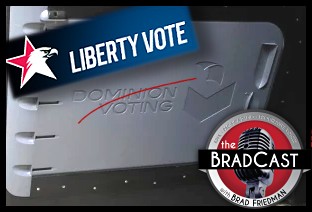 Trump-Allied GOP Partisan Buys Dominion Voting Systems: 'BradCast' 10/22/25
Trump-Allied GOP Partisan Buys Dominion Voting Systems: 'BradCast' 10/22/25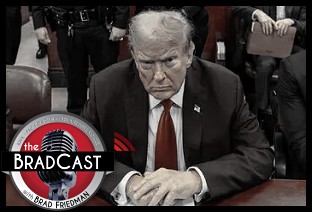 Trump, Republican Law(lessness) & (Dis)Order: 'BradCast' 10/21/25
Trump, Republican Law(lessness) & (Dis)Order: 'BradCast' 10/21/25 'Green News Report' 10/21/25
'Green News Report' 10/21/25 Celebrating 'No Kings': 'BradCast' 10/20/25
Celebrating 'No Kings': 'BradCast' 10/20/25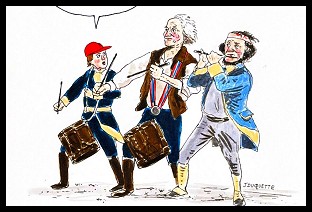 Sunday 'How It Started' Toons
Sunday 'How It Started' Toons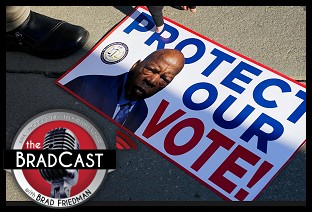 SCOTUS Repubs Appear Ready to Gut Rest of Voting Rights Act: 'BradCast' 10/16/25
SCOTUS Repubs Appear Ready to Gut Rest of Voting Rights Act: 'BradCast' 10/16/25 'Green News Report' 10/16/25
'Green News Report' 10/16/25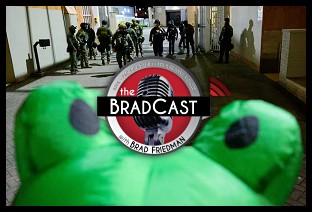 The 'Epstein Shutdown' and Other Autocratic Nightmares: 'BradCast' 10/15/25
The 'Epstein Shutdown' and Other Autocratic Nightmares: 'BradCast' 10/15/25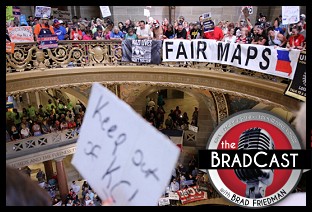 Group Vows to Block MO's GOP U.S. House Gerrymander: 'BradCast' 10/14/25
Group Vows to Block MO's GOP U.S. House Gerrymander: 'BradCast' 10/14/25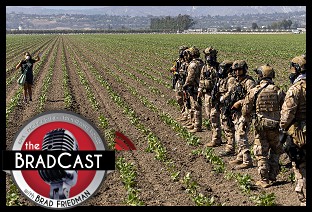 Trump Labor Dept. Warns Trump Policies Sparking Food Crisis: 'BradCast' 10/9/25
Trump Labor Dept. Warns Trump Policies Sparking Food Crisis: 'BradCast' 10/9/25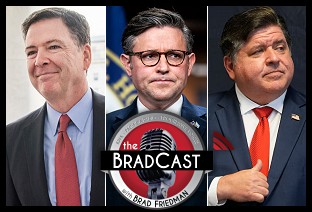 Trump's Losing Battles: 'BradCast' 10/8/25
Trump's Losing Battles: 'BradCast' 10/8/25 Trump, Roberts and His Stacked, Packed and Captured SCOTUS: 'BradCast' 10/7/25
Trump, Roberts and His Stacked, Packed and Captured SCOTUS: 'BradCast' 10/7/25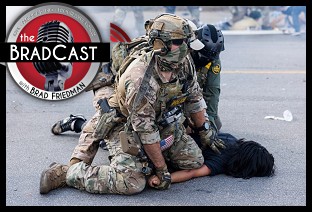 Trump Attempting His 'Invasion from Within': 'BradCast' 10/6/25
Trump Attempting His 'Invasion from Within': 'BradCast' 10/6/25 Biden Budget Expert: Mass Firings in Shutdown 'Illegal': 'BradCast' 10/2/25
Biden Budget Expert: Mass Firings in Shutdown 'Illegal': 'BradCast' 10/2/25 Why is DOJ Suing 'Blue' States for Their Voter Databases?: 'BradCast' 10/1/25
Why is DOJ Suing 'Blue' States for Their Voter Databases?: 'BradCast' 10/1/25
 VA GOP VOTER REG FRAUDSTER OFF HOOK
VA GOP VOTER REG FRAUDSTER OFF HOOK Criminal GOP Voter Registration Fraud Probe Expanding in VA
Criminal GOP Voter Registration Fraud Probe Expanding in VA DOJ PROBE SOUGHT AFTER VA ARREST
DOJ PROBE SOUGHT AFTER VA ARREST Arrest in VA: GOP Voter Reg Scandal Widens
Arrest in VA: GOP Voter Reg Scandal Widens ALL TOGETHER: ROVE, SPROUL, KOCHS, RNC
ALL TOGETHER: ROVE, SPROUL, KOCHS, RNC LATimes: RNC's 'Fired' Sproul Working for Repubs in 'as Many as 30 States'
LATimes: RNC's 'Fired' Sproul Working for Repubs in 'as Many as 30 States' 'Fired' Sproul Group 'Cloned', Still Working for Republicans in At Least 10 States
'Fired' Sproul Group 'Cloned', Still Working for Republicans in At Least 10 States FINALLY: FOX ON GOP REG FRAUD SCANDAL
FINALLY: FOX ON GOP REG FRAUD SCANDAL COLORADO FOLLOWS FLORIDA WITH GOP CRIMINAL INVESTIGATION
COLORADO FOLLOWS FLORIDA WITH GOP CRIMINAL INVESTIGATION CRIMINAL PROBE LAUNCHED INTO GOP VOTER REGISTRATION FRAUD SCANDAL IN FL
CRIMINAL PROBE LAUNCHED INTO GOP VOTER REGISTRATION FRAUD SCANDAL IN FL Brad Breaks PA Photo ID & GOP Registration Fraud Scandal News on Hartmann TV
Brad Breaks PA Photo ID & GOP Registration Fraud Scandal News on Hartmann TV  CAUGHT ON TAPE: COORDINATED NATIONWIDE GOP VOTER REG SCAM
CAUGHT ON TAPE: COORDINATED NATIONWIDE GOP VOTER REG SCAM CRIMINAL ELECTION FRAUD COMPLAINT FILED AGAINST GOP 'FRAUD' FIRM
CRIMINAL ELECTION FRAUD COMPLAINT FILED AGAINST GOP 'FRAUD' FIRM RICK SCOTT GETS ROLLED IN GOP REGISTRATION FRAUD SCANDAL
RICK SCOTT GETS ROLLED IN GOP REGISTRATION FRAUD SCANDAL VIDEO: Brad Breaks GOP Reg Fraud Scandal on Hartmann TV
VIDEO: Brad Breaks GOP Reg Fraud Scandal on Hartmann TV RNC FIRES NATIONAL VOTER REGISTRATION FIRM FOR FRAUD
RNC FIRES NATIONAL VOTER REGISTRATION FIRM FOR FRAUD EXCLUSIVE: Intvw w/ FL Official Who First Discovered GOP Reg Fraud
EXCLUSIVE: Intvw w/ FL Official Who First Discovered GOP Reg Fraud GOP REGISTRATION FRAUD FOUND IN FL
GOP REGISTRATION FRAUD FOUND IN FL

































